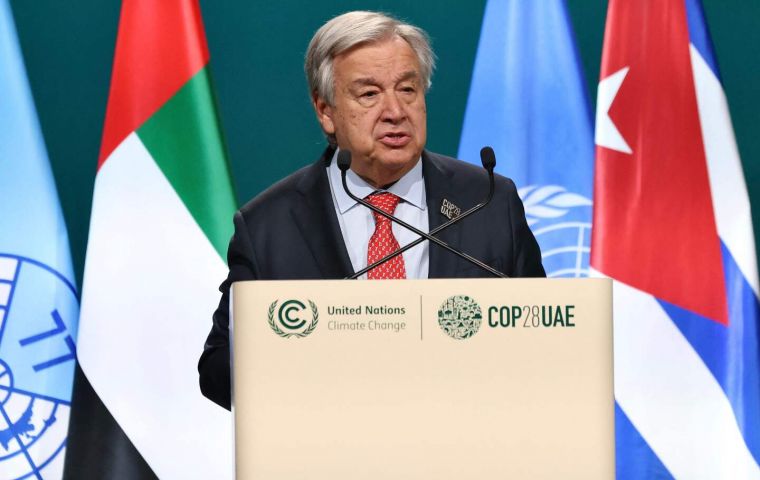MercoPress. South Atlantic News Agency
Oil companies' pledge deemed insufficient at COP28
 “The Decarbonization Charter fails to address the fundamental issue of fossil fuel consumption,” Guterres argued
“The Decarbonization Charter fails to address the fundamental issue of fossil fuel consumption,” Guterres argued While 50 leading oil companies and more than 100 countries committed at the Conference of Parties (COP28) to reducing their methane emissions and up their energy efficiency, experts and activists claim these measures address the visible effects, but not the root of the problem.
Environmental groups have called this measure a “smokescreen” and United Nations (UN) Secretary-General António Guterres warned that “promises fall short” because “the Decarbonization Charter fails to address the fundamental issue of fossil fuel consumption” as it “does not provide clarity on getting to zero emissions by 2050.”
In addition, 116 countries, including the United States, Canada, Japan, and the European Union, have pledged to double energy efficiency by 2030, in addition to tripling installed renewable energy capacity. However, notable absentees such as China, India, and Russia have generated criticism about the extent and effectiveness of these commitments.
The European Union has announced an investment of € 2.3 billion over the next two years to support the energy transition both in the region and globally.
Among the oil companies signing this commitment were national oil giants such as Saudi Aramco, Brazil's Petrobras, and Angola's Sonangol, as well as multinationals such as Shell, TotalEnergies, and BP.
But Guterres argued the oil and gas industry fell “far short” of addressing the climate crisis in a meaningful way, although it was a “step in the right direction.”
The 50 signatories committed to “carbon neutral operations” by 2050, to end routine flaring by 2030, and to reduce methane emissions to near zero.
Methane, a potent greenhouse gas, is a primary component of natural gas and is responsible for about one-third of global warming.
Guterres, who referred to oil and gas companies as the “giants behind the climate crisis,” also noted that the agreement does not provide clarity on the path to zero emissions by 2050, which is “absolutely essential to ensure integrity.”
“The science is clear: we must phase out fossil fuels in a timeframe compatible with limiting global warming to 1.5 degrees,” he added.
Guterres also presented a report by the UN Office for Disaster Risk Reduction and the UN World Meteorological Organization, which shows that more lives are being protected from extreme weather events and the dangerous effects of climate change, although the pace of progress remains insufficient. To date, 101 countries reported having an early warning system in place, an increase of six countries compared to last year, and representing a doubling of coverage since 2015. However, according to the report, half of the world's countries still do not have adequate multi-hazard early warning systems in place.
While 50 leading oil companies and more than 100 countries committed at the Conference of Parties (COP28) to reducing their methane emissions and up their energy efficiency, experts and activists claim these measures address the visible effects, but not the root of the problem.
Environmental groups have called this measure a “smokescreen” and United Nations (UN) Secretary-General António Guterres warned that “promises fall short” because “the Decarbonization Charter fails to address the fundamental issue of fossil fuel consumption” as it “does not provide clarity on getting to zero emissions by 2050.”
In addition, 116 countries, including the United States, Canada, Japan, and the European Union, have pledged to double energy efficiency by 2030, in addition to tripling installed renewable energy capacity. However, notable absentees such as China, India, and Russia have generated criticism about the extent and effectiveness of these commitments.
The European Union has announced an investment of € 2.3 billion over the next two years to support the energy transition both in the region and globally.
Among the oil companies signing this commitment were national oil giants such as Saudi Aramco, Brazil's Petrobras, and Angola's Sonangol, as well as multinationals such as Shell, TotalEnergies, and BP.
But Guterres argued the oil and gas industry fell “far short” of addressing the climate crisis in a meaningful way, although it was a “step in the right direction.”
The 50 signatories committed to “carbon neutral operations” by 2050, to end routine flaring by 2030, and to reduce methane emissions to near zero.
Methane, a potent greenhouse gas, is a primary component of natural gas and is responsible for about one-third of global warming.
Guterres, who referred to oil and gas companies as the “giants behind the climate crisis,” also noted that the agreement does not provide clarity on the path to zero emissions by 2050, which is “absolutely essential to ensure integrity.”
“The science is clear: we must phase out fossil fuels in a timeframe compatible with limiting global warming to 1.5 degrees,” he added.
Guterres also presented a report by the UN Office for Disaster Risk Reduction and the UN World Meteorological Organization, which shows that more lives are being protected from extreme weather events and the dangerous effects of climate change, although the pace of progress remains insufficient. To date, 101 countries reported having an early warning system in place, an increase of six countries compared to last year, and representing a doubling of coverage since 2015. However, according to the report, half of the world's countries still do not have adequate multi-hazard early warning systems in place.




Top Comments
Disclaimer & comment rulesCommenting for this story is now closed.
If you have a Facebook account, become a fan and comment on our Facebook Page!